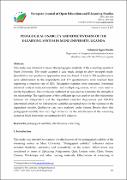Pedagogical usability and effectiveness of the e-learning system in Muni University, Uganda
| dc.contributor.author | Pacuto, Ngos Solomon | |
| dc.date.accessioned | 2018-06-11T14:05:55Z | |
| dc.date.available | 2018-06-11T14:05:55Z | |
| dc.date.issued | 2017 | |
| dc.identifier.citation | en_US | |
| dc.identifier.issn | 25019120 | |
| dc.identifier.uri | ||
| dc.description.abstract | This study was intended to unveil the pedagogical usability of the e-learning system in Muni University. The study adopted a case study design to allow in-depth study. Quantitative and qualitative approaches were employed. A total of 218 questionnaires were administered to the respondents and 179 questionnaires were received back registering a response rate of 82%. Descriptive statistics were computed. Inferential statistical analysis included correlation and multiple regressions, which were used to test the hypotheses. The correlation coefficient (r) was used to determine the strength of the relationship. The significance of the coefficient (p) was used to test the relationship between the independent and the dependent variables. Regressions and ANOVA determined which of the independent variables accounted most for the variance in the dependent variable. Qualitative data were analyzed under themes. Results show that pedagogical usability has very high influence on the effectiveness of the e-learning system at Muni University accounting for 82% variance. | en_US |
| dc.language.iso | en | en_US |
| dc.publisher | European Journal of Open Education and E-Learning Studies | en_US |
| dc.relation.ispartofseries | Vol.2;No.I | |
| dc.subject | Pedagogical usability | en_US |
| dc.subject | Effectiveness | en_US |
| dc.subject | E-learning | en_US |
| dc.subject | Muni University | en_US |
| dc.subject | Uganda | en_US |
| dc.title | Pedagogical usability and effectiveness of the e-learning system in Muni University, Uganda | en_US |
| dc.type | Article | en_US |
Files in this item
This item appears in the following Collection(s)
-
Research Articles [50]

